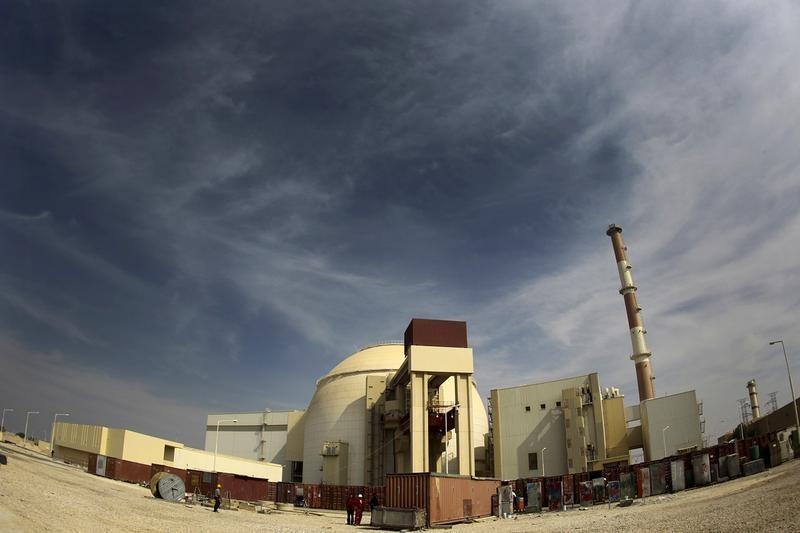
- ARAB NEWS
- 15 Jul 2025

Politicians and state-controlled news outlets in Iran this week paid significant attention to a recently released report by the International Atomic Energy Agency (IAEA) and the possibility of Iran’s nuclear file being sent to the UN Security Council (UNSC).
Iranian Foreign Minister Mohammed Javad Zarif warned the European powers against involving the UNSC, according to the Tasnim News Agency. He said that, if Iran’s nuclear file was sent to the UNSC, the Islamic Republic has the ability to pull out of the nuclear Non-Proliferation Treaty (NPT). The Ettela’at newspaper carried a story quoting Zarif under the headline: “Zarif: Iran to take strong decision if its case sent to UN Security Council.”
The NPT’s objectives are to prevent the spread of nuclear weapons and weapons technology, while promoting the peaceful application of nuclear energy and technology. It also seeks to achieve nuclear disarmament throughout the world. As a party to the NPT, the Islamic Republic is required to reveal its nuclear sites and cooperate with the IAEA. The text of the agreement states: “Each non-nuclear-weapon state party to the treaty undertakes to accept safeguards… with a view to preventing the diversion of nuclear energy from peaceful uses to nuclear weapons or other nuclear explosive devices.”
If Tehran pulls out of the NPT, it will no longer be required to release any information about its nuclear sites or its research and development, and it could pursue nuclear weapons if it desired to do so.
Nevertheless, Zarif’s threat to withdraw from the NPT is mainly rhetoric aimed at pressuring the EU not to report Iran’s nuclear case to the UNSC. Iran has long enjoyed many benefits of being a party to the NPT. One is that members can share the latest nuclear technology for peaceful purposes. Secondly, Iran uses the NPT as cover for its covert nuclear activities. By being a party to the NPT, Tehran has gained global legitimacy while secretly pursuing its nuclear ambitions. In the last two decades, many clandestine nuclear sites have been detected, which Tehran failed to report to the IAEA as it is obligated to do under the NPT.
A credible 2018 report from the Institute for Science and International Security explained that Tehran planned to build nuclear weapons in the early 2000s. It said: “Iran intended to build five nuclear warheads, each with an explosive yield of 10 kilotons and able to be delivered by ballistic missile… Another document available from the archive provides an early look at how Iran planned to achieve its goal of designing and manufacturing five nuclear weapons by about 2003.”
One of the factors that has raised questions about Iran’s nuclear file is the IAEA’s increasing concern about Tehran’s nuclear defiance. In March, the IAEA “identified a number of questions related to possible undeclared nuclear material and nuclear-related activities at three locations in Iran.” The agency’s Director General Rafael Grossi stated: “The fact that we found traces (of uranium) is very important. That means there is the possibility of nuclear activities and material that are not under international supervision and about which we know not the origin or the intent.”
The IAEA this month also revealed that the Iranian regime is now violating all the restrictions of the Joint Comprehensive Plan of Action (JCPOA), commonly known as the Iran nuclear deal. The Iranian leaders justify their violations of the nuclear agreement by arguing that the US was first to break the JCPOA’s terms when it unilaterally withdrew in 2018. But Iran was breaching the deal even before the Trump administration reimposed sanctions on Tehran. For instance, in a 2018 speech to the UN General Assembly, Israeli Prime Minister Benjamin Netanyahu revealed that Iran had a “secret atomic warehouse for storing massive amounts of equipment and material from Iran’s secret nuclear weapons program.” Although Iranian leaders insisted that the nuclear warehouse was actually just a carpet cleaning facility, traces of radioactive uranium were detected at the site by IAEA inspectors.
Zarif’s threat to withdraw from the NPT is mainly rhetoric aimed at pressuring the EU.
Dr. Majid Rafizadeh
In order to keep the world safe, the international community must not surrender to Iran’s warnings. Tehran has long issued empty threats to force the world into accepting its demands. For example, in January, when the UK, France and Germany triggered the JCPOA’s dispute resolution mechanism, Iran’s foreign ministry issued a direct warning, saying: “If Europeans, instead of keeping to their commitments and making Iran benefit from the lifting of sanctions, misuse the dispute resolution mechanism, they’ll need to be prepared for the consequences that they have been informed about earlier.”
It is incumbent on the signatories to the nuclear deal to report Tehran’s nuclear defiance and send the country’s nuclear dossier to the UNSC.
Dr. Majid Rafizadeh is a Harvard-educated Iranian-American political scientist. Twitter: @Dr_Rafizadeh